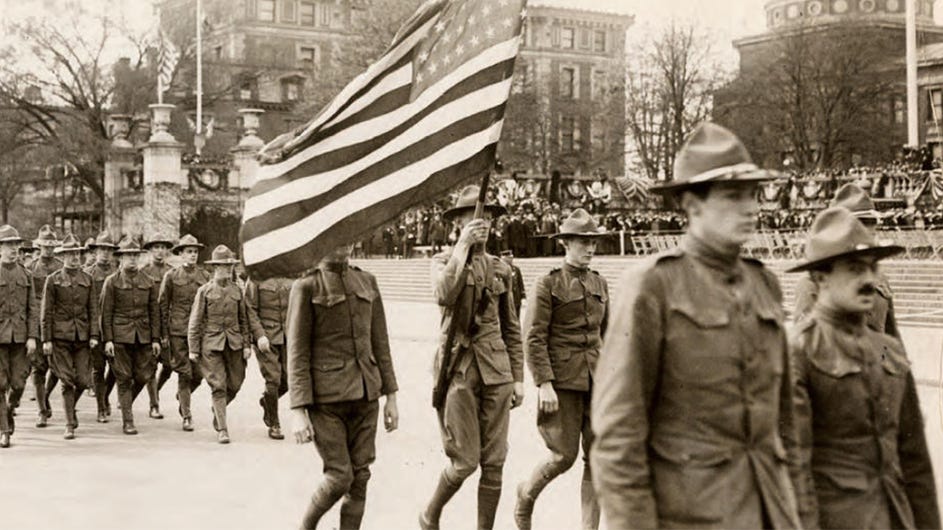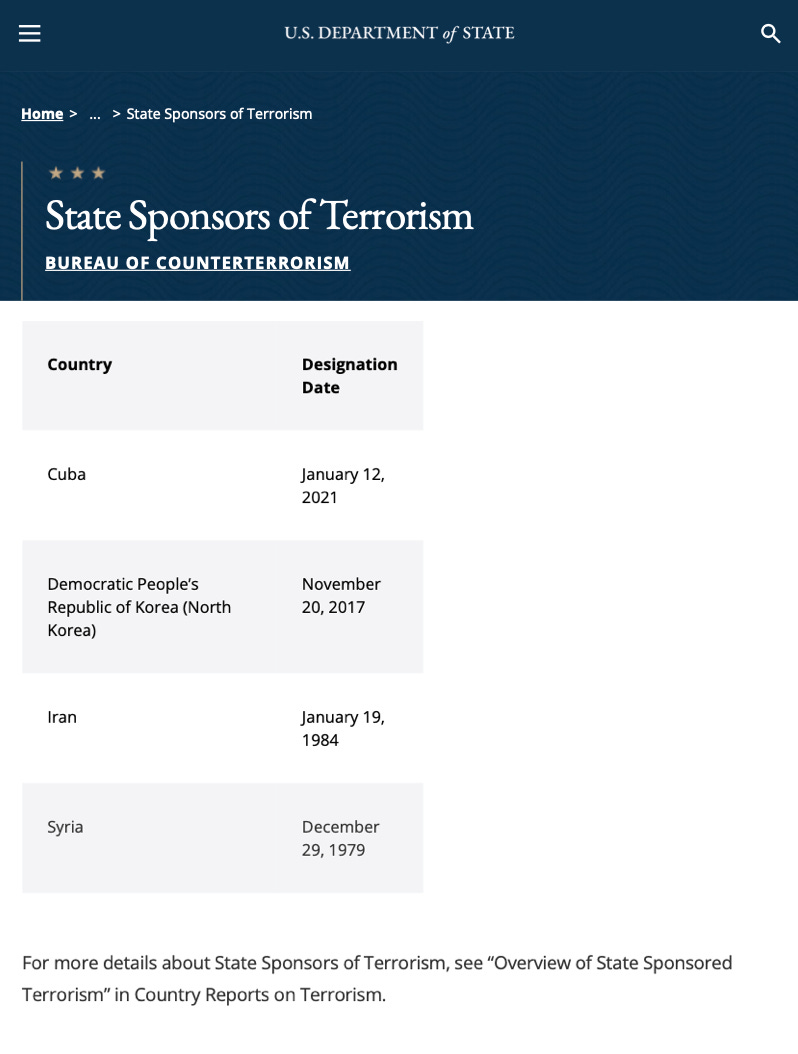Normalize Patriotism
Why Columbia students need to stop cosplaying as militants of the Global South
American Columbia students, like the rest of Gen Z, are spending their formative years in an existential identity crisis. Instead of accepting their national identity, they are keen to join any movement that rejects America in favor of fantasies of joining the globally oppressed, a phenomenon we have seen play out all too clearly this past spring.
Only 18 percent of Gen Z says they are “extremely proud” to be American, a figure that has been declining over the past two decades (in 2013, 55 percent of young people said the same). It’s no wonder, then, that the vast majority of Columbia students support Columbia University Apartheid Divest (CUAD), a coalition whose core tenets include the claim that “any force that is fighting for Palestinian national liberation against U.S. imperialism and its lackeys is progressive.”
Anti-American sentiments are not new among Columbia students or young people in this country. In the 1930s, 3,000 Columbia students alongside thousands of other college students in the United States and Europe took the Oxford Pledge, an anti-militarist vow whose American version read, “I refuse to support the Government of the United States in any war it may conduct.”
Students who took the pledge were widely accused of being anti-patriotic and pro-communist for refusing to support the defense of their country and its values. As a result, grassroots communist organizations such as the American Student Union eventually changed their position, calling on “the United States to become an active force for peace” by “taking immediate steps to restrain fascist aggression.” This decision nearly a century ago reflected a deep collective investment in the state of the nation despite the groups having otherwise fringe political beliefs at the time.
The campus pro-Palestinian movement, on the other hand, has gone even further than the Oxford Pledge. CUAD very boldly markets themselves as “a continuation of the Vietnam anti-war movement” with the ultimate goal of building “an entire world free from colonialism and imperialism.”
To the average Columbia liberal, this phrasing is otherwise innocuous and the morally correct position to take. But CUAD and Students for Justice in Palestine’s activism make clear that the language of “anti-colonialism” and “anti- U.S. imperialism” within the pro-Palestine movement are strategic fronts for supporting war and violence against America and her allies.
One prominent example is the outward support the groups express for the Houthis, a U.S.-designated terrorist group whose slogan includes “Death to America.” When the U.S. responded to Houthi bombings of ships in the Red Sea this January, SJP organized a protest where students chanted, “Yemen, Yemen, make us proud, turn another ship around.” In their Instagram post announcing the protest, SJP referred to America and the other countries of the Global North as “genocidal colonial empires,” and if you think America is a better place to live than, say, Yemen, “you’ve bought into the the illusion that these ruthless colonial empires are ‘democracies.’”
It’s clear from SJP’s and their allies’ messaging that they believe Western democratic influence is merely exploitative and unethical, and they invoke accusations of “genocide” in hopes of rallying compassionate college students to stand against democratic countries’ power. Violence, as they’ve abundantly made clear since October 9, is justified when it’s committed against the U.S. and its allies since “Palestinians have no avenues but violence to protect and liberate themselves.”
Together with their promotion of “resistance” movements, CUAD actively rejects everything to do with Western democracy, values, and symbols in favor of “oppressed people worldwide.” In their words, they “are westerners fighting for the eradication of western civilization” which makes it unsurprising that I witnessed the majority of protestors booing the American flag and national anthem at campus demonstrations in April.
The danger for students outside these groups arises when they subscribe to the Palestinian cause but end up quietly going along with the anti-American crusades of the movement’s more extreme factions.
Students, whether or not they identify as pro-Palestinian, should take care not to fall for the anti-U.S., anti-West trap. America has not had an easy history, but one enduring lesson from our past is that Americans ought to feel invested in this country, no matter how dark times get. While that doesn’t require a blind allegiance to this country (we have freedom of speech, after all), it should mean basic respect for the nation—and its people—that afforded every one of us a level of privilege and prosperity unmatched in human history.
We should recognize that there are some things worth keeping—our bumpy pursuit of individual freedom, equality under the law, and the consent of the governed has, over time, advanced human rights and progress for all; our country’s pioneering of civic nationalism over ethnic nationalism means, in the words of former President Ronald Reagan, that “anyone, from any corner of the Earth, can come to live in America and become an American.” (Yes, the immigration system has flaws and limitations, but America is unique in that those who naturalize can unflinchingly call themselves American).
Say the protestors “globalize the intifada” right here from Morningside Heights which brings about an “end to all interlocking systems of oppression.” The countries next in line for the position of global hegemon won’t help them get what they want. There’s China, a country that’s forcibly put millions of Uyghurs in “reeducation camps” and where the entire population lives under a one-party surveillance state. There’s also Russia, who has stripped their citizens of every imaginable civil right, taken journalists hostage, and assassinated opposition leaders. Let’s not forget, of course, that all of these nations along with Iran and North Korea operate in opposition to American values and form an “axis of evil” built on the destruction of American leadership. We may not be perfect, but we are the best and only hope to lead an international order built on human dignity.
In other words, the “progress” CUAD envisions won’t come from the destruction of the U.S.-led world order, but instead is only possible through Western values.
The campus left's insistence that a “free Palestine” will naturally lead to “collective safety” that “invests in life-affirming institutions,” rejects the very real existential threat on Jewish and Israeli life from Hamas, Hezbollah, the Houthis, and Iran, or, in their words, the “Resistance Front.”
It will instead take Western values and leadership to achieve sustained peace in the Middle East that could advance the “life-affirming institutions” CUAD supports. The United States, with the support of forward-thinking countries like the United Arab Emirates and Bahrain, mediated the Abraham Accords in 2020, a huge step towards Arab-Israeli normalization. In Congress, there is support from both parties for some form of a two-state solution. Western leadership has certainly had its failures in the Middle East, notably in Taliban-controlled Afghanistan and in the tragic number of civilian deaths in Iraq, but to argue that the absence of Western influence in the region would make everyone live happily ever after is a delusional position unrooted from historical evidence.
Columbia’s protestors should also remind themselves how entrenched Western values are in their day-to-day life, starting with free speech. Every time they protest, every time they shout, picket, and post, they enjoy a Western product not readily available in countries of the Axis of Resistance. It’s a privilege that protestors can take advantage of a key American freedom, then call for the eradication of the society that made that freedom available.
The alarming anti-American sentiments we’ve witnessed call for a drastic change in mindset—it’s time for young people to normalize patriotism, regardless of their position on America’s performance on the global stage. Patriotism does not mean support for military aid to Israel, a two-state solution, or a one-state solution. Patriotism is simply a belief that the American system, even with its flaws, can and will provide the tools necessary to advocate and bring about global progress. It’s a repudiation of the tear-the-system-down, proletariat revolution-coded discourse that dominates the campus left today.
Of course, for the true revolutionaries among us who will never abandon their hatred of America, I can only direct them to where they are better suited.
Ms. Chaudhry is a junior at Columbia College studying history and a staff editor for Sundial.





Something worth writing about is a despicable recent statement from Columbia University Apartheid Divest (CUAD)’s recent substack post https://cuapartheiddivest.substack.com/p/resistance-reaches-the-core-of-the. where they display outright support for civilian-targeting terrorism in writing "On October 1, in a significant act of resistance, a shooting took place in Tel Aviv, targeting Israeli security forces and settlers. This bold attack comes amid the ongoing escalation of violence in the region and highlights the growing resolve of those resisting Israeli occupation. The shooting serves as a reminder that the struggle is not confined to Gaza or Lebanon but has now reached deep into the heart of settler-colonial territory, further destabilizing the Zionist regime's claims to security and control.“